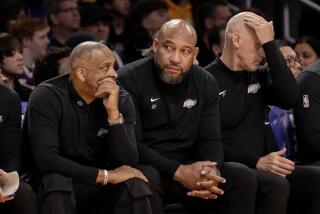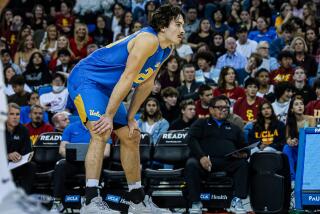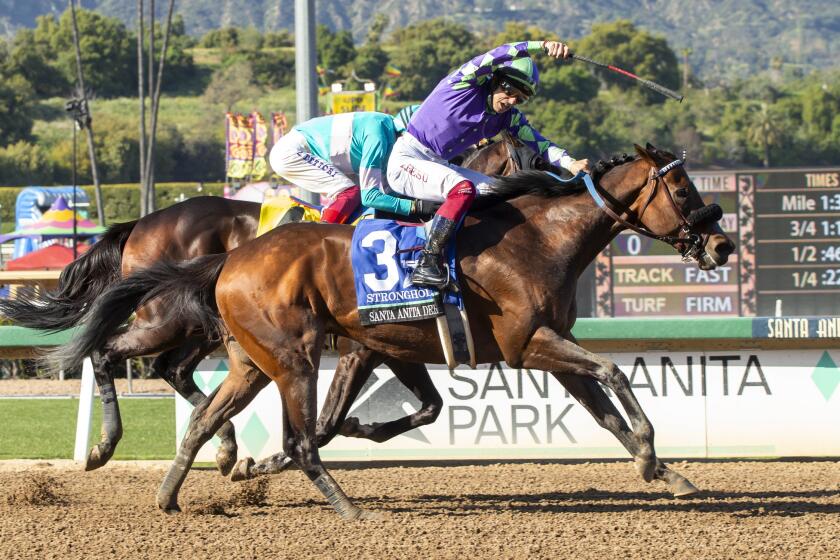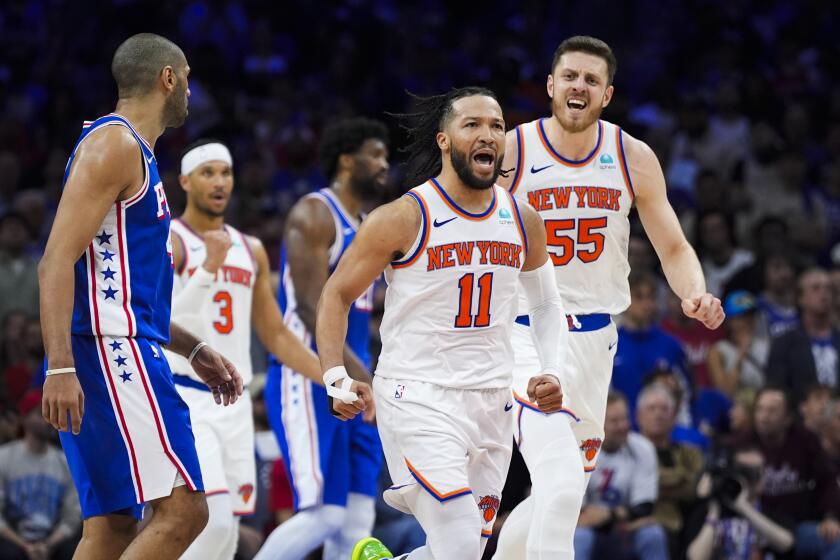No Debate About It : Occidental in the ‘50s Was Where Kemp Learned to Stand and Deliver
When George Allen coached the Whittier Poets in the ‘50s, his scouting report on Occidental College’s quarterback might have read that he could think on his feet, scramble under duress until he found an opening and deliver stinging darts.
Forty years later, Al Gore’s scouting report could read much the same as he prepares for tonight’s debate of vice presidential candidates against Jack Kemp.
“I don’t worry about Jack at all in this kind of situation,” says Doug Gerhart, Kemp’s backup at quarterback during the 1955 and ’56 seasons at Occidental.
“Jack loves to compete and, under pressure that most of us never face at the highest levels of sports and politics, he’s very controlled.”
Memories of Kemp as the Occidental Tigers’ quarterback come easily to many former teammates because they refresh them often.
Although Kemp has lived in New York or Washington for more than three decades and has had a demanding schedule in roles as Congressman, Cabinet member and candidate, heseldom fails to visit when traveling to the West Coast cities where most of them live.
That some of his most important friendships were forged on the small, quiet Eagle Rock campus was apparent within moments after he finished his acceptance speech for the Republican party’s vice presidential nomination in August in San Diego. With Bob Dole at his side, among the first persons Kemp greeted after descending from the stage to the floor was one of his special guests to the convention, Gerhart.
Occidental, a private, liberal arts college with an enrollment at the time of 1,200, was not necessarily a simple place in the years Kemp attended, 1953-57, but it was unquestionably simpler than today.
Most students resembled Bud and Betty Anderson from “Father Knows Best,” the women with short, permed hair and dressed in long skirts and bobby sox, the men with crew cuts wearing short-sleeved shirts with button-down collars and bluejeans. Virtually all were white. The student newspaper did not ignore subjects such as the Cold War and the 1956 presidential election between Dwight Eisenhower and Adlai Stevenson, but more space was devoted to the new dining hall and the decision to allow men to visit women’s dorms and vice versa.
Serious debates were reserved for the Quad, a tree-shaded, concrete area at the center of the campus where students gathered after lunch. Kemp could often be found sitting on one of the benches, even then defending his vision of what he considered an enlightened free enterprise system.
The foundation for his philosophy no doubt was formed during discussions around his staunchly Republican family’s kitchen table, where his father, who turned a one-motorcycle delivery business into a small trucking company in Los Angeles, and his teacher-social worker mother encouraged discussion by their four sons. Jack, the third son, was known for stubbornly clinging to his arguments even when he had few facts to support them.
To correct that shortcoming at Occidental, Kemp became an avid reader of U.S. News & World Report, the Wall Street Journal and the New York Times.
“The rest of us read Sports Illustrated,” says Gerhart, vice president of a satellite navigation firm in the Silicon Valley. “Not that Jack didn’t. It was just that he was interested in other things as well.”
But if Kemp was political, no one recalls considering the possibility that he might become a politician. He was involved in neither student government nor the Young Republicans.
“He was the type of guy who liked to argue, not that you had any thought whatsoever of him doing what he’s doing now,” says Jim Mora, Kemp’s favorite receiver at Occidental and now coach of the New Orleans Saints. “I think of a guy who had a goal to be a professional football player and who dedicated everything he had toward that goal.”
At the same time, his former teammates are not surprised that Kemp has reached such heights in politics. To them, the odds were almost as great against him becoming a pro quarterback. He played for 13 years, most of them in the American Football League with the San Diego Chargers and Buffalo Bills.
“Jack sets his goals and achieves them,” says Ron Botchan, who played with Kemp as a lineman and linebacker at Occidental and San Diego.
Kemp once said that he set his goal to be a pro football player when he was 9.
“It never crossed my mind that I wouldn’t be,” he said.
It was apparent that Kemp was a good athlete at Fairfax High, but his small stature--5 feet 10, 150 pounds--prevented him from being a standout quarterback. He was not recruited by USC or UCLA. A friend from high school and college, Russ Ray, says that Kemp went to Occidental because of summer days they spent together watching the Washington Redskins when they held training camps there.
During a campaign speech last week in New Haven, Conn., Kemp used himself as an example of hope in America by telling a story about the inspiration he received from his freshman football coach at Occidental, Payton Jordan.
“I would not tell anybody that I wanted to play pro football because I was afraid they’d laugh,” Kemp said. “The only person who would not laugh at my dreams was my mother.
“But Coach Jordan calls me into his office and says, ‘Kemp, I’ve been watching you. You are a disgrace to this football team. You’re not working hard enough. You’re not putting out. I want you to go out there and start throwing the football, throwing baseballs, throwing the javelin. You’ve got to start sacrificing.’
“And then he said something. ‘Don’t tell anybody, but of all the players on my team, you’re the one. You can go to the NFL someday.’ When I walked out of that room, I would have run through a brick wall for Payton Jordan.
“About eight years ago, we had a reunion of our football team. Guess what? We’re sitting around after the banquet, kibitzing with each other, having a Coca-Cola. And we found out that Coach Jordan, confidentially, had told every single player on the team that they could play pro football if they worked harder . . . “
No one worked as hard as Kemp, unless it was the pass catchers he recruited to work out with him before and after practices and during summers. Most often, they were Mora and running back Mike Quint.
“He would throw to us until our tongues were hanging out,” says Quint, an Orange County insurance broker.
To give himself the body of a pro quarterback, Kemp began lifting weights long before that was being done by most skill-position players.
“He wouldn’t even take a vacation without his weights,” says Botchan, a physical education instructor at L.A. City College and an NFL umpire for the last 17 years. “Going to Mammoth one year to ski, our car broke down because it was so loaded down with his weights.”
Kemp, a physical education major, said last week that he was so committed to football that he had difficulty focusing on his studies. His friends say that he was intelligent but made good grades only in subjects in which he had a particular interest. Otherwise, his academic record was lackluster until several years later, when he returned to school for his master’s degree.
“It’s true that I was tunnel-visioned in terms of the goals I had for myself, which was to play pro football,” Kemp told Esquire in 1978. “But I got a good education just the same. You couldn’t get out of Oxy without learning something. I majored in P.E., but you had to take 34 hours of history and some premed courses, all the sciences.”
More than once, Kemp was put on probation for not attending required assemblies.
“I’m not sure he ever went to one,” Gerhart says. “We were usually out throwing the ball around or lifting weights in the gym.”
By the time he became the starting varsity quarterback as a junior, Kemp weighed close to 180 pounds and could throw the ball with more zip than the Redskin quarterbacks who worked out at Occidental in the summers.
“When I was on defense, I hated to run drills against him,” Botchan says. “He’d throw the ball so hard, I wouldn’t put my hand in front of it.”
Kemp held the school record for a time in the javelin throw, which was much more appreciated on campus than his ability to throw a football 80 yards. Occidental was a national power in track and field, able to hold its own in dual meets with USC and UCLA.
The Big Man on Campus was not the star quarterback but the star pole vaulter, Bob Gutowski, who won the silver medal in the 1956 Summer Olympics. The athletic highlight of Kemp’s senior year, ‘56-57, was a dual meet victory over Stanford, then coached by Jordan. Gutowski set the world record that afternoon at 15 feet 8 1/2 inches.
In contrast, the football team rarely attracted national attention while playing in the Southern California Intercollegiate Conference against schools such as Whittier and Caltech.
Kemp had his most success as a senior, when he was the nation’s third-ranking small-college passer, completing 92 of 184 passes for 1,123 yards. He was honorable mention Little All-American and attracted the attention of the Pittsburgh Steelers, who made him the 77th player selected in the draft. But Occidental won only three of nine games that season.
Gerhart, who became an offensive assistant coach with four NFL teams before entering business, says the Tigers might have won more games if the coaching had been more sophisticated.
“The big innovation in those days was to split a receiver out wide,” Gerhart says. “The coaches didn’t take a look at the kind of talent Jack had and design a passing game to take advantage of an arm like that. That didn’t happen at the small-college level in that decade.
“Jack would draw a play in the dirt and then run around until he found a receiver open.”
Kemp, also a safety and the team’s punter, found it difficult to accept defeat. But it was not always his competitive nature that blinded him to reality.
In his final game for Occidental, he passed for two touchdowns and ran for three. After the final extra point had been kicked, he hugged Quint and yelled, “We won! We won!”
Quint informed Kemp that the Tigers had lost, 39-34.
“He was nearsighted and couldn’t read the scoreboard,” Quint said.
Staff writer Maria La Ganga contributed to this story.
* TONIGHT’S DEBATE: 6 p.m.
* ADDITIONAL COVERAGE: A1
More to Read
Get our high school sports newsletter
Prep Rally is devoted to the SoCal high school sports experience, bringing you scores, stories and a behind-the-scenes look at what makes prep sports so popular.
You may occasionally receive promotional content from the Los Angeles Times.






